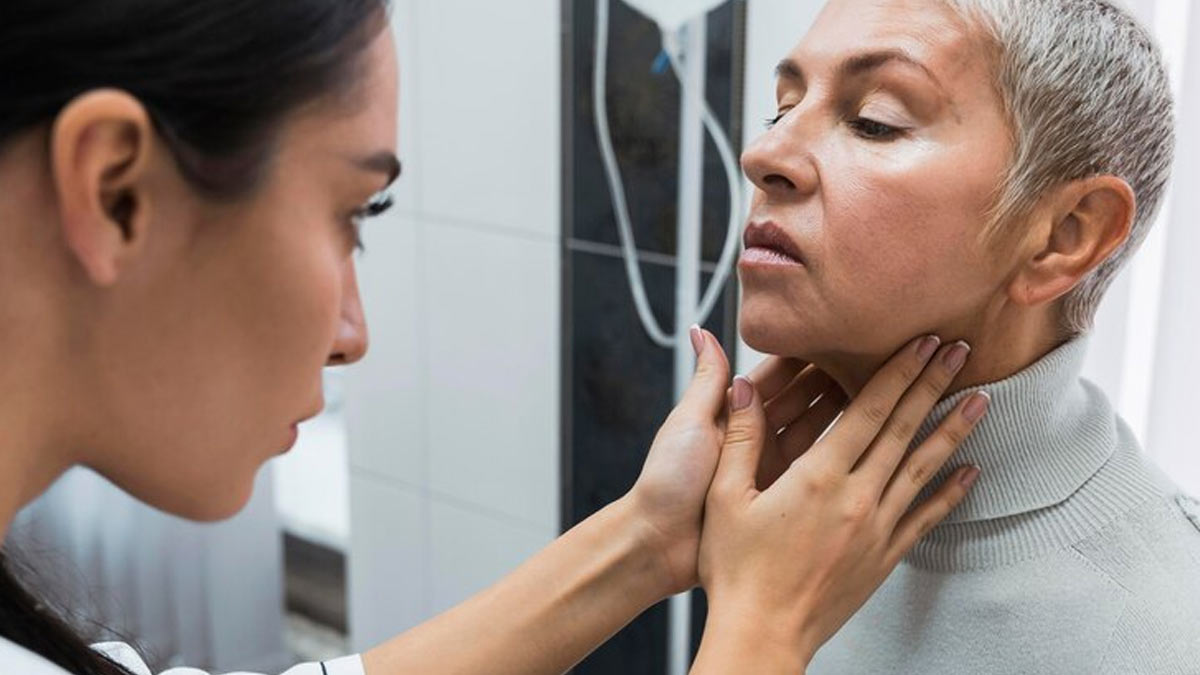
Head and neck cancer, also referred to as squamous cell carcinomas of the head and neck, occurs in the mouth, nose, lips, throat, larynx, salivary glands, and sinuses. According to the National Cancer Institute (NCI), it is usually caused by tobacco and alcohol use; however, in certain cases, infection with cancer-causing types of human papillomavirus (HPV), especially HPV type 16, can also contribute to the same.
Table of Content:-
It is also crucial to note that head and neck cancer primarily affects older people. In an interaction with the OnlyMyHealth team, Dr Somashekhar S P, Lead Consultant - Surgical and Gynaecological Oncology and Robotic Surgeon, Aster CMI Hospital, Bengaluru, sheds light on what makes senior citizens more at risk.
Also Read: Should Older Adults Take Statins If They're Healthy? A Cardiologist Answers
What Makes Senior Citizens More At Risk Of Head And Neck Cancer?

"Age plays a pivotal role in increasing the risk of developing cancer, including head and neck cancer," says Dr Somashekhar, explaining that over time, prolonged exposure to risk factors such as tobacco and alcohol use can significantly raise cancer risk. Additionally, as we age, our immune system weakens, making us more susceptible to infections and cancer.
He adds, "Ageing also leads to the accumulation of genomic mutations, including P53 mutations, which further elevate the risk of cancer development."
According to the doctor, tobacco use remains the most significant risk factor, followed by alcohol consumption, HPV infection, and a diet that is not high in fibre and antioxidants associated with a high intake of processed food and salt.
Moreover, exposure to irritants like asbestos, wood dust, or certain chemicals can contribute to the development of head and neck cancer. It is also important to note that chronic infections and weak immune systems, bad dental hygiene, sharp teeth, ill-fitted dentures, and constant irritation may also increase the risk.
Symptoms Of Head And Neck Cancer To Watch Out For

Some of the common symptoms of head and neck cancer in older adults include:
- Constant sore throat
- Cough which does not settle down
- Inability to swallow
- A lump or mass in the neck or mouth
- Earache
- Unexplained weight loss
- Weakness in the face
- Changes in taste or smell
- Change in voice not settling down in 4-6 weeks
- Nasal blocks are not improving with medical treatment.
How To Reduce The Risk Of Head And Neck Cancer

While there is no way to predict who will and who won’t develop head and neck cancer, there are certain strategies to reduce the risk. These include:
- Avoid tobacco and limit alcohol, which are the key contributors to cancer. These are major risk factors.
- Follow good oral hygiene: Regular dental check-ups and proper care can prevent oral issues.
- Follow a skincare routine. Use sunscreen with a high SPF to shield against sun damage.
- Schedule regular check-ups.
- One should follow a balanced diet with fruits, vegetables, and whole grains.
- Get vaccinated: The HPV vaccine can reduce the risk of certain cancers.
- Dental prophylaxis and good oral hygiene play a crucial role.
Also Read: Vaccination In Older Adults: How It Can Promote Healthy Ageing In India
Treatment Options
According to Dr Somashekhar, the treatment for head and neck cancer in senior citizens can differ from that in younger patients.
He says, "Older adults with head and neck cancer may face unique challenges due to increased risk of complications and potential decreased tolerance to certain treatments. Underlying health conditions may impact treatment decisions."
He adds, "Treatment goals for older patients often prioritise improving quality of life over achieving a complete cure, whereas treatment plans should be tailored to individual needs, considering factors such as the stage of cancer, overall health, and patient preferences."
It is important to note that HPV virus status can influence treatment decisions, particularly in geriatric patients. Quality of life, speech and swallowing function, dental health, and tolerance for radiation and major plastic surgery are all factors that may be more challenging in older patients.
Also watch this video
How we keep this article up to date:
We work with experts and keep a close eye on the latest in health and wellness. Whenever there is a new research or helpful information, we update our articles with accurate and useful advice.
Current Version